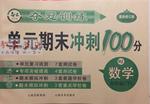题目内容
【题目】听下面一段较长对话,回答以下小题。
【1】Where does the woman want to go?
A.To her home.B.To a restaurant.C.To a stadium.
【2】How does the man feel about his work?
A.Relaxed.B.Worried.C.Uninterested.
【答案】
【1】B
【2】B
【解析】
【原文】
W: We always eat early. Let’s go out for a late dinner at a restaurant tonight instead.
M: You know the game is on at 8:00, dear. We should get home before that.
W: But you watch sports every night! I miss spending time with you.
M: This season is important, and my job depends on it. There are too many journalists now, and they’re getting younger and younger.
W: But you have more experience.
M: True. I’m good at what I do, but audiences want newer faces these days. I need to stay on top if I don’t want to get fired. But I promise I’ll take you on a nice vacation when it’s all over. We’ll spend a week at the beach!

 夺冠训练单元期末冲刺100分系列答案
夺冠训练单元期末冲刺100分系列答案 新思维小冠军100分作业本系列答案
新思维小冠军100分作业本系列答案 名师指导一卷通系列答案
名师指导一卷通系列答案